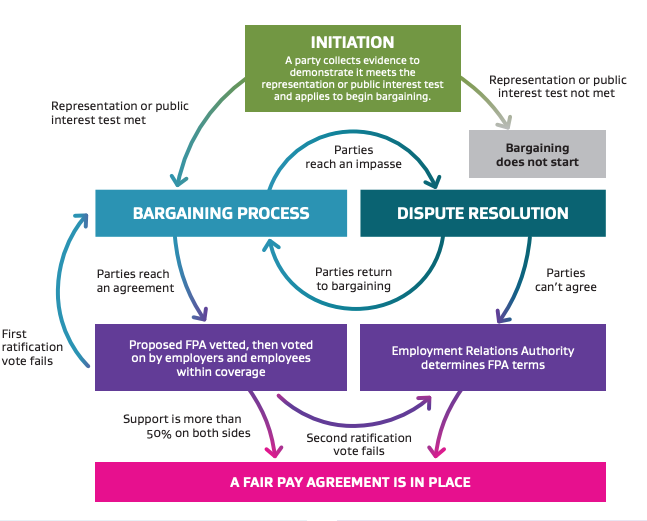This is a system whereby the outcome of collective negotiations is translated into minimum legal employment standards.
Now it is clear that:
- Only unions will be allowed to initiate bargaining for a Fair Pay Agreement for low pay, low bargaining power, lack of pay progression, long or unsocial hours (to be assessed by the Employment Relations Authority – criteria for assessment have not been specified);
- Unions will decide whether the agreement shall refer to the industry or the occupation and determine also the agreement’s scope and coverage;
- The Fair Pay Agreement will ultimately cover all workers and employers in that industry or occupation;
- Neither employers nor employees are able to opt out of bargaining a Fair Pay Agreement, that is nevertheless directly applying to them;
- The government will oversee the bargaining process and ensure compliance with the law;
- Any disputes will be settled by means of compulsory arbitration which, in the absence of agreement, ultimately will fix the terms of the agreement. There will be no right of appeal against terms that are fixed by arbitration.
“Representativeness” is a clear issue of the upcoming Fair Pay Agreement System. According to the Government proposal, “registered unions will represent workers including non-union members”.
However, less than 20% of the New Zealand workforce is unionised (<10% in the private sector). Thus, a vast majority of workers will be represented by unions that have no prior connection with them. Together with the facts that only unions may initiate a Fair Pay Agreement (only 1000 workers or 10% of workers in proposed coverage per industry or occupation), Fair Pay Agreements risk being seen as no more than a vehicle for unions to become the primary influencers of wages and conditions, irrespective of prevailing market and economic conditions.

The Government intends to introduce a law into Parliament by the end of 2021 and it will possibly enter into force in 2022.
Overall, this is a clear move back with regards to industrial relations traditions in New Zealand. In particular, the voluntarily nature of collective bargaining is scraped by negotiations “forced” by compulsory arbitration awards.
As said, compliance of such a system with international labour standards and principles is questionable. Indeed, it would breach the principle of free and voluntary negotiation enshrined in article 4 of the Right to Organise and Collective Bargaining Convention of the International Labour Organisation (ILO), 1949 (No. 98), ratified by New Zealand Government in 2003.
Moreover, Business New Zealand (BusinessNZ) warned the government in all public consultations that this system, apart from giving the trade unions a disproportionate capacity to determine wages and working conditions, might increase complexity, costs and result in loss of productivity.
BusinessNZ shared its concerns with the ILO already in 2019 by addressing inquiries to the Normes department of the International Labour Office. To date the Government of New Zealand has not replied to any of the Office requests for more information. Thus, BusinessNZ now intends to take its concerns to the Governing Body of the ILO via a representation procedure under Article 24 of the ILO Constitution.
Roberto Suarez Santos, Secretary General of the International Organisation of Employers (IOE) expressed sincere concern on the potential breach by the government of New Zealand on ILO fundamental conventions.He said “this Fair Pay Agreement could undermine the principle of effective recognition of Collective Bargaining enshrined under ILO Convention 98 and the 1998 ILO Declaration on Fundamental Principles and Rights at Work. The fact that the New Zealand Government had openly acknowledged that its proposed reforms would challenge the principle of free and voluntary bargaining enshrined in Convention 98 is of particular concern”.
In an interview provided to New Zealand media, BusinessNZ Chief Executive Kirk Hope said: “There would be nothing “fair” about Fair Pay Agreements. Any pay deals reached wouldn’t be fair because the process is essentially compulsory – employers would be required to agree to what unions wanted, with compulsory arbitration if they didn’t. This is against international law, which says collective agreements should always be negotiated voluntarily”.